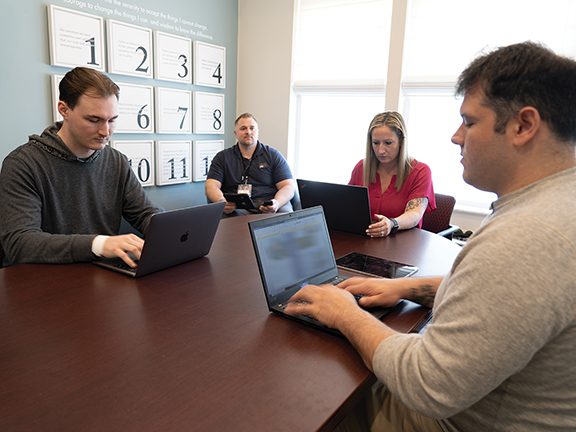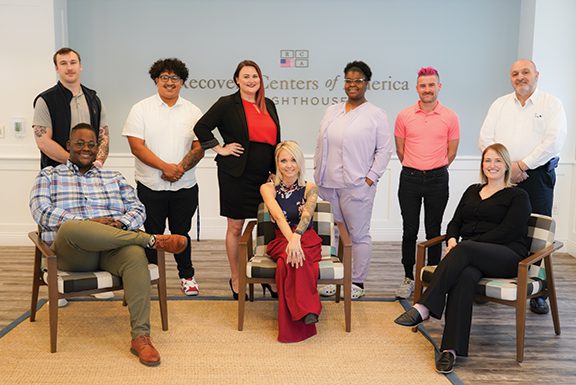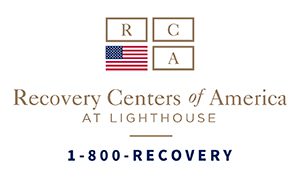Recovery Centers of America at Lighthouse
Inpatient treatment that allows you to work and study

Work or study while in treatment
LIKE MANY PEOPLE LIVING AND STRUGGLING WITH ADDICTION, Dillon was desperate to get better. Yet he knew all too well that he couldn’t break free from substance abuse without intensive help. Still, committing to in-patient treatment – which he knew he needed – could come at a huge cost: He would likely lose his job.
“I tried to go to treatment before,” he says. “But because of my concern about work, I always left and shortly relapsed after.”
Then last year, when Recovery Centers of America at Lighthouse began providing space and time for patients to work and study virtually during their stay in RCA’s Mays Landing facility, Dillon was finally able to get the help he needed.
“People sometimes only come in for the initial detox and then realize they are able to stay when they find out about Work/SchoolFlex.”
Work/SchoolFlex, a service unique to RCA, started during the pandemic for working professionals, college students and adult high school students – when businesses and schools began offering virtual options. As one of the first RCA facilities to offer Work/SchoolFlex, Lighthouse addiction experts have now seen dozens of patients successfully complete 30- or 40-day treatment programs while they also worked or kept up their studies.
Founded on the premise that addiction is a disease, RCA at Lighthouse offers a full range of expert and compassionate treatment for alcohol and drug addiction from a world-class team of doctors, nurses and therapists in a luxury setting. On a daily basis, Lighthouse serves approximately 100 to 110 patients with in-treatment recovery plans. There is no cap on how many can take part in Work/SchoolFlex, which breaks down a major barrier that, in the past, prevented many from focusing on recovery, says Corey Richey, RCA at Lighthouse CEO.
“It’s something good that came out of the pandemic,” says Richey. “We’ve had people so many times tell us ‘I can’t come in because of work’ or because they have school. In reality, their substance use is so severe they’re running the risk of losing their job or dropping out of school anyway. Or, unfortunately, with the strength of opioids today, they’re running the risk of dying. So being able to get them into treatment gives them that intense in-patient level of care they need to start their journey of recovery while they’re still attending to the duties that they have outside of here.”
The program arrives at a time when in-treatment recovery services are desperately needed, says Richey. More Americans died of drug overdoses in 2021 – approximately 100,000 – than any previous year, according to the National Center of Health Statistics.

The team at Recovery Centers of America at Lighthouse
Since the start of the 21st century, an overdose epidemic led by prescription pain pills and followed by waves of heroin, fentanyl and meth, has killed more than 1 million people – and experts say there is no end in sight.
“We are seeing people who have never had a substance use problem or who are now relapsing because of the social isolation and, quite frankly, it’s easier to hide an addiction when you’re not going into an office or school,” she says.
An added bonus: Work/SchoolFlex gives patients a strong foundation for staying focused on their recovery after they leave the program and life’s pressures heat up again, says Mallory Roth, Lighthouse’s Director of Admissions.
“It teaches them that they can work or study and stay committed to their recovery,” she says, noting that there are no additional costs associated with Work/SchoolFlex and that most insurers are now paying for in-patient treatment. “As long as they are willing to follow our procedures, including not going on social media or their phone for non-work reasons, it works. They bring their own laptop and phone and we have everything else they need.”
Typically, patients start their in-patient recovery journey undergoing a 7- to 10- day medically-supervised detox to manage withdrawal symptoms safely and comfortably. RCA’s in-treatment program then provides a structured environment centered on individual, group and family therapy, educational and support groups, as well as art and music sessions and 12-step activities. Clients also receive psychiatric, nutritional, spiritual, and other services as needed.
“People sometimes only come in for the initial detox and then realize they are able to stay when they find out about Work/SchoolFlex,” says Crystal Fabrizio, Lighthouse clinical director. “It’s a long day but we work with them so they can get the most benefit from the program.”
For Dillon, Work/SchoolFlex was a game changer.
“Because I was able to work, I felt like I could actually concentrate more on my recovery because I was not worrying about work,” he says. “It eased my mind knowing that I was still connected to what needed to be done within the timeframe given, then the remainder of the day I could focus on my recovery.”
Patients participating in the Work/SchoolFlex benefit from:
- Dedicated work sessions (AM or PM option), 5 to 7 days a week
- Private, confidential setting to complete employment or academic responsibilities
- Access to personal phone and laptop, as well as internet access through facility WIFI during allotted work time (to be used solely for work and school related activities)
- Meal service during work time


